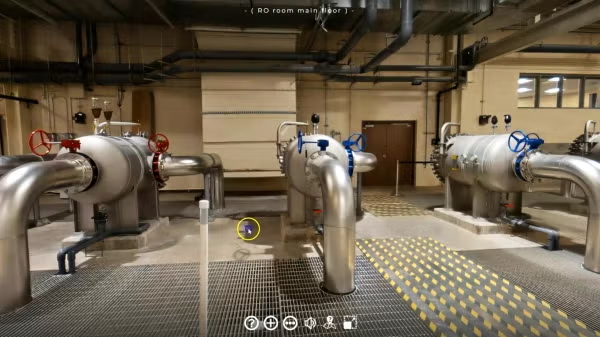Crow awarded NCSE Lifetime Achievement Award on Science, Service and Leadership

James Buizer (left), interim director of the Arizona Institute for Resilient Environment and Societies at the University of Arizona, presents ASU President Michael M. Crow with the 2020 NCSE Lifetime Achievement Award on Science, Service and Leadership on Jan. 7 at the National Council on Science and the Environment’s annual conference in Washington, D.C. Photo by Hager Sharp
When hundreds of scientists and science advocates attending the National Council on Science and the Environment’s (NCSE) annual conference crowded into the Regency Ballroom at the Omni Shoreham Hotel in Washington, D.C., for a lunchtime session, they were visibly excited for more than the food being served.
On Tuesday, Jan. 7, Arizona State University President Michael Crow was presented the 2020 NCSE Lifetime Achievement Award on Science, Service and Leadership for his commitment to pursuing environmental sustainability while improving higher education.
The session opened with an introductory video featuring Crow and several of his colleagues explaining his career and how it has influenced his passion for sustainability. Crow has devoted his time in academia to creating programs that promote sustainability both at ASU and beyond, with an emphasis on developing program models that are fully inclusive and representative of the communities they serve. His colleagues also described how Crow has motivated and inspired others to follow his innovative thinking to achieve environmental sustainability.
Upon accepting the award from James Buizer, interim director of the Arizona Institute for Resilient Environment and Societies at the University of Arizona, Crow emphasized the need to break down barriers between academia and the rest of the world if we are to improve how we communicate the need for sustainability to combat environmental crises.
“We need to understand that some people can’t hear us, and they can’t hear us because we’re not speaking in a way that they yet understand,” Crow said. “It’s not because they’re stupid.”
He added that academic institutions should be responsible for finding ways of communicating relevant research to the public if we, as a society, are to better understand both the scale of social problems and the costs and benefits of possible solutions.
Following his acceptance speech, Crow was interviewed by Frank Sesno, Emmy Award-winning journalist and director of the School of Media and Public Affairs at the George Washington University. Their discussion focused on Crow’s career-spanning efforts on sustainability and included dialogue with the scientists in the audience.
Sesno’s questions led Crow to discuss how academic institutions need to rethink how they are structured and how they encourage their faculty to pursue certain research projects. Crow encouraged academia to be more adaptable in order to produce knowledge and outcome-driven research that will make the world more sustainable.
“We haven’t designed an interactive, alive, yet protected, culture of knowledge production, knowledge transfer, knowledge use,” Crow said, “And then how do we communicate that knowledge within a democracy?” He believes we should be pushing academics to think about how they want their understanding of certain topics to contribute to the social good.
Throughout the discussion, Crow highlighted how ASU has incubated innovative and outcome-driven research, pointing to the university’s School of Sustainability as just one example.
Questions from the audience mostly centered on the theme that traditional academic bureaucracy can inhibit the outcome-driven research Crow encourages, and attendees wanted to understand how to push for the kind of academic structure he has established at ASU.
Crow’s responses to these questions generally dealt with the “archaic” nature of academia. He believes institutions are set on being just like every other university and are afraid to be different.
The take-home message Crow left with session attendees was that change will come from action and that younger generations need to implement the ideas they have in order to create sustainable change. In addition, universities should be supporting — not hindering — their students’ goals of enacting new ideas.
“This is not as much a rhetorical fight as it is an action fight,” Crow said. “The rhetoric is out there, the words are out there, so let’s just do things.”
More Environment and sustainability

Homes for songbirds: Protecting Lucy’s warblers in the urban desert
Each spring, tiny Lucy’s warblers, with their soft gray plumage and rusty crown, return to the Arizona desert, flitting through…

Public education project brings new water recycling process to life
A new virtual reality project developed by an interdisciplinary team at Arizona State University has earned the 2025…

ASU team creates decision-making framework to improve conservation efficiency
Conserving the world’s ecosystems is a hard job — especially in times of climate change, large-scale landscape destruction and…

